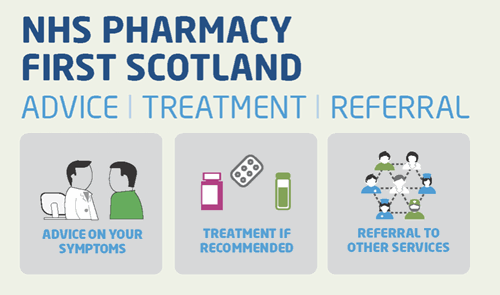- Home
- Our Services
- Resources
- COVID-19
- Useful Information
The Pharmacist
Pharmacists
Following the introduction of the new GP contract in 2018 pharmacists are now increasingly involved in the care of patients in General Practice.
Here in Braids Medical Practice we now have a team of clinical pharmacists who are based in the practice on the following days:
Tuesday: Susanne Gooding
Wednesday: Sian Stapleton
Friday: Sian Stapleton
When you contact the practice about a medication matter you may be offered an appointment with one of our pharmacists. You can also request to speak with the pharmacist yourself. Our pharmacists can provide telephone and face-to-face appointments.
The clinical pharmacists work closely with our GP's providing the following:
- expertise on day-to-day medicine
- advice for patients taking multiple medications
- medication reviews and other medicines-related support, including discussing side effects
- help for patients with their medicines following a stay in hospital, particularly if there has been a change
- medications and prescription related queries
- prescription authorization
- blood test request authorization
- support managing patients’ long-term conditions, such as high blood pressure
NHS Pharmacy First Scotland is an NHS service provided by your local community pharmacy.
Community Pharmacists are experts in medicines and can help with minor health concerns. They can give you advice and treatment (if you need it) for various minor illnesses and common clinical conditions
You can use NHS Pharmacy First Scotland if you are registered with a GP practice in Scotland or you live in Scotland.
You do not usually need an appointment and you can go to any pharmacy.
Your community pharmacist can advise you about conditions such as:
- Acne
- Allergies
- Athlete's foot
- Backache
- Blocked or runny nose
- Cold sores
- Constipation
- Cough
- Cystitis (in women)
- Diarrhoea
- Period pain
- Shingles
- Some skin conditions such as cellulitis or insect bites
- Sore throat
- Threadworms
- Thrush
- Urinary tract infections (UTI's)
- Verrucas
- Warts
Medicine and Polypharmacy Reviews
Often the pharmacists or the doctor will review your medicine and talk about the medicines you are currently taking. In the Practice we like to review your medicine at least once a year, on the month of your birthday. However sometimes your medicine may be reviewed more frequently.
You might also have heard people referring to Polypharmacy. It means lots of medicines. A medicine review is particularly useful for people who take a lot of medicines, for these people their medicines review may be called a Polypharmacy Review.
Information about what a medicine and polypharmacy review is can be found here

Information on how you and your doctor (or other healthcare professional) can work together to decide whether you need a medicine and, if so, which to prescriber, can be found in the Healthcare Improvement Scotland publication Medicines in Scotland: What’s the right treatment for me?
. This booklet also explains about the likely benefits and possible risks of medicines.
There is also a summary of this information here.
Information about getting the right treatment for common illnesses such as colds and coughs without encouraging antibiotic resistance can be found in the NHS publication Get Well Soon Without Antibiotics
There is also a summary of this information here.
Information about getting the right treatment for common illnesses such as colds and coughs without encouraging antibiotic resistance can be found in the NHS publication Get Well Soon Without Antibiotics
WHEN SHOULD I WORRY? - Your guide to Coughs, Colds, Earache & Sore Throats in Children
Having an ill child can be a very scary experience for parents. If you understand more about the illness it can help you to feel more in control. Information can be found here
about how to deal with common infections in children who are normally healthy.
- Most common infections do not get better quicker with antibiotics.
- Most children with a cold, cough, sore throat or earache, who see their GP, will still be ill 4 days later. This does not mean that they need treatment or need to be seen again.
- One third of children who have seen their GP with a cough will still be coughing 2 weeks later. This does not mean that they need treatment.
- Only children with signs of more serious illness generally need to be seen by a doctor or nurse. These signs include:
- - Excessive drowsiness
- - Difficulty breathing or rapid breathing
- - Cold or discoloured hands &/or feet with warm body
- - Abnormal pains in arms &/or legs
- - Abnormal colour (pale or blue)
- - An infant who is not feeding or any child that is showing signs of dehydration such as dry mouth, sunken eyes, no tears and looking generaly unwell
Respect Us: We’re here to help.
Our practice and pharmacy staff come to work to care for others, and it is important that they are treated with respect, in the same way that we respect our patients. Aggressive or threatening behaviour directed towards our staff will not be tolerated under any circumstances and anyone who is verbally abusive to staff may be removed from the Practice list.
Please respect the team that looks after you.
Telephone: 0131 445 5999
Call Us
The Braids Medical Practice, 6 Camus Avenue, Edinburgh EH10 6QT


